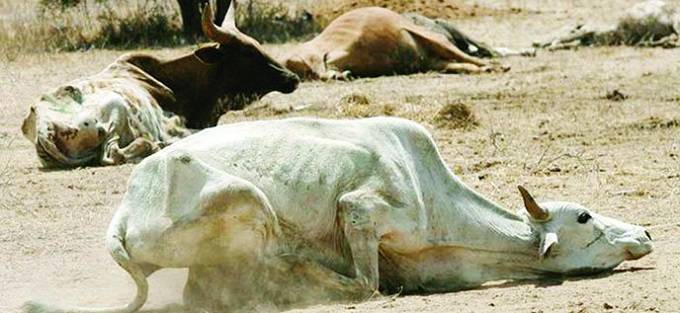
Andile Tshuma, Chronicle Reporter
NEARLY 9 000 head of cattle have died in Matabeleland North and South provinces due to the effects of the drought.
The most cattle deaths have been recorded in Matabeleland South.
Matabeleland South Provincial livestock officer Mr Mario Muchemwa said over 7 600 beasts had died since August due to lack of pastures and water.
He said desperate farmers were selling off their animals for as low as $250 each, yet under normal circumstances they should get $6 000.
“We are now urging farmers to adopt priority feeding where they concentrate on lactating and pregnant cattle. They should also be selling the beasts, in as much as the market is flooded so that they can buy feed and save the rest of their herd,” said Mr Muchemwa.
“High temperatures sped up the evaporation process and there is little to no water for drinking for the animals, as there are also acute water shortages for people to get water to drink. Animals have been on relief grazing for a long time and even that has now been exhausted, it is not good.”
In a separate interview, Matabeleland North Provincial Agritex officer Mr Addmore Chikowa said 1 276 cattle had died in the province.
He said the livestock situation in the province was dire as water reservoirs had dried up. Mr Chikowa said competition between humans and livestock for water was nearly reaching unprecedented levels.
“The situation is dire. Boreholes are drying up and most dams and rivers dried up long ago as a result of siltation, they never held much water,” said Mr Chikowa.
“The province is losing millions in terms of livestock value. As it is, as at 30 October 2019, we have recorded deaths on 1 276 beasts. A single beast costs an average of US$300 to US$450 which translates to around RTGS $5 000 which gives us way over 6 million dollars as value lost in these deaths. It is bad.”
He said Binga district was the most affected so far, having lost over 400 cattle during this dry season as grazing areas had dried up.
Mr Chikowa also said that the dry season was worsening the human and wildlife conflict, as farmers took their livestock to national parks territory for relief grazing, where they also fell prey to lions. Meanwhile, the Meteorological Services Department (MSD) has said the rainy season has not yet started even though some areas had started receiving isolated showers.
It said hot and dry days ahead are expected.—@andile_tshuma
